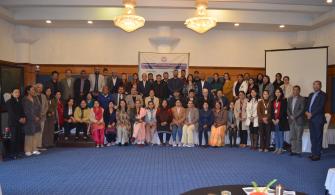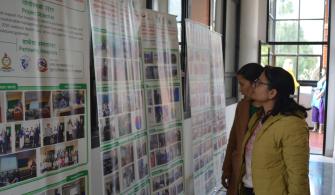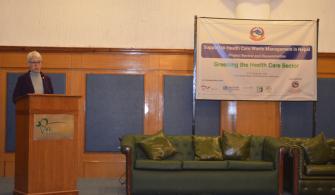Over the past two years, Health Care Without Harm worked closely with HECAF360, the Deutsche Gesellschaft für Internationale Zusammenarbeit (German Development Agency, GIZ), an implementing agency of German development Cooperation in Nepal, and the Management Division/Department of Health Services in the "Support for Healthcare Waste Management in Kathmandu 2021-2023" project. The primary goal of this initiative is to support institutions in achieving sustainable health care waste management and promoting environmental resilience in Nepal.
During December 5 and 6, more than 150 participants joined the hybrid dissemination meeting - online and in-person - that marked the finalization of the project, and where they shared their experiences, projects, and lessons learned during the project. On the first day, the agenda spanned the comprehensive sustainability topics championed by the Global Green and Healthy Hospitals Network, encompassing waste management, climate initiatives, procurement strategies, and more. On day 2, the focus shifted to the project's achievements, lessons gleaned, and forward-looking perspectives on sustaining and amplifying the impacts of the project in the long term.

Greening the Healthcare Sector in Nepal: lessons learned
In the opening session, Dr. Roshan Pokhrel, Secretary of MoHP, emphasized the significance of hospitals taking ownership of the program. He highlighted, "While the initiative and foundation have been led by the Ministry of Health & Population of Nepal, in collaboration with external consultants and development partners, it is crucial for hospitals to sustain and advance the initiation on their own for the 13 hospitals."
Key discussion topics included educational initiatives, skill-sharing, and community-building, aligning with the Global Green and Healthy Hospitals sustainability agenda. The discussions also touched upon climate resilience and environmental sustainability in health care facilities, procurement as a tool to minimize waste and address climate change, and capacity-building for monitoring and reporting in healthcare waste management.

“Challenges were faced by the health care sector during the COVID-19 pandemic, including the lack of protocols for managing COVID waste”, said Dr Sarvesh Sharma, Director of the Management Division at the Department of Health Services, and added: “This event provides a platform to address these issues and contribute to a better future in the healthcare sector.”
During the event, Prerana Dangol, Senior Program Officer at HECAF360, presented the Broader Sustainability Agenda in Nepal. She discussed community mobilization challenges encountered in healthcare waste management and outlined long-term plans.

Ruth Stringer at Greening the Healthcare Sector in Nepal: lessons learned
Health Care Without Harm’s International Science and Policy Coordinator Ruth Stringer delivered a presentation highlighting the project's main achievements. These included training initiatives, reducing needle stick injuries, replicating waste management practices inwards, decreasing infectious waste, recycling efforts, and financial gains. She stressed the importance of statistical analysis and data collection, concluding, "If you can't measure it, you can't manage it."